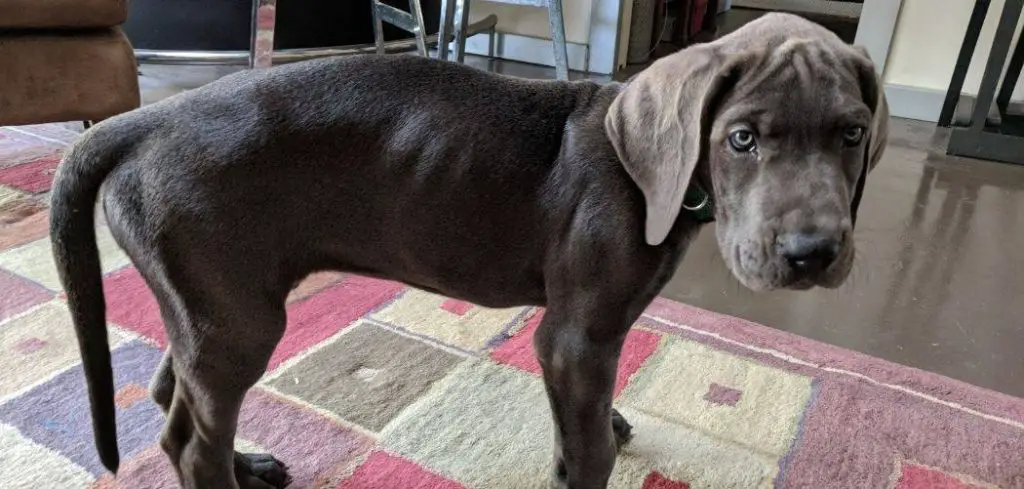When your dog is panting heavily and also having accidents in the house, it can be alarming and confusing.
While both symptoms may occur independently, their combination often points to stress or age-related problems.
We outline the common causes of a dog panting and having accidents, what you can do at home, and when to seek veterinary help.
Table of Contents
Dog Panting and Having Accidents — Why It Happens
A dog panting and having accidents in the house or house soiling may both be signs your dog is physically or emotionally distressed. Dogs pant to regulate their body temperature, but they also pant when in pain, anxious, or unwell.
Accidents, especially in previously housetrained dogs, may indicate urinary tract infections, gastrointestinal issues, cognitive decline, or mobility problems. When the two symptoms appear together, the situation warrants a closer look.

Common Causes of Dog Panting and Having Accidents
Urinary Tract Infection (UTI)
A UTI can make your dog feel uncomfortable, increasing panting due to pain or fever, while also causing urgent, frequent urination—or accidents in the house.
Dogs with UTIs may strain to urinate, pass small amounts of urine, or have blood in their urine. They may also lick at their genitals and appear restless. Panting often reflects their internal discomfort or elevated body temperature.
A simple urine test can confirm a UTI, and most cases are easily treated with antibiotics.
Anxiety or Stress
Stressful situations like thunderstorms, fireworks, separation anxiety, or new environments can cause both panting and inappropriate urination or defecation.
Panting is a classic stress response, as is pacing, trembling, or hiding. Some anxious dogs lose control of their bladder or bowels, especially if panic sets in.
If stress is the likely trigger, behavioral training or anxiety-reducing tools (like calming chews or compression vests) may help. In severe cases, a vet may recommend anti-anxiety medications.
Canine Cognitive Dysfunction (Dog Dementia)
Older dogs may develop cognitive issues similar to dementia in humans. This can cause confusion, panting episodes, and house soiling—even if they were reliably housetrained for years.
Dogs with cognitive dysfunction may pace at night, appear disoriented, stare at walls, or forget commands. They might also forget house rules, leading to accidents. Panting can accompany confusion or distress.
There are supplements and medications that may help slow cognitive decline. Routine, enrichment, and environmental cues can also support aging dogs.
Pain or Discomfort
Injuries, arthritis, or internal pain (like pancreatitis or gastrointestinal upset) can cause panting and reduced mobility. Dogs in pain may have accidents simply because it hurts to move or posture correctly.
Watch for signs of limping, whining, reluctance to go outside, or difficulty getting up. Pain-related accidents are especially common in senior dogs or those recovering from surgery.
Your vet may recommend pain relief, anti-inflammatory medication, or physical therapy.
Gastrointestinal Illness
Digestive upset—due to dietary indiscretion, infection, or chronic issues like IBD—can cause panting (from nausea or discomfort) and accidents in the form of diarrhea or vomiting indoors.
Dogs may be visibly uncomfortable, pace, whine, or seem bloated. If your dog has diarrhea or vomiting along with panting, consider this a sign to contact your vet.
Keep note of your dog’s diet, bowel habits, and any recent changes that may have triggered GI upset.
Endocrine Disorders (e.g., Cushing’s Disease)
Cushing’s disease (excess cortisol production) often causes excessive panting, increased thirst, and frequent urination—leading to accidents even in housetrained dogs.
Dogs may also show a pot-bellied appearance, hair thinning, or skin changes. Cushing’s is more common in middle-aged to older dogs.
A vet can diagnose Cushing’s through blood tests and recommend appropriate management.
What to Do If Your Dog Is Panting and Having Accidents
First, monitor your dog’s behavior carefully. Look for patterns—are the accidents happening at night, only when you’re away, or during specific events?
Observe their panting: is it constant, worse at certain times, or paired with restlessness or whining? Check their hydration, appetite, and stool or urine quality.
Clean any accident spots with enzyme-based cleaners to discourage repeat incidents. Never punish your dog—it may worsen anxiety or confusion.
Make note of:
Frequency and timing of accidents
Amount and consistency of urine or stool
Changes in behavior, appetite, or sleep
Signs of pain or discomfort
When to Call or Visit Your Vet
Call your vet promptly if:
Your dog is panting excessively and having frequent accidents
You notice blood in urine or stool
They seem disoriented, lethargic, or in pain
Accidents started suddenly in a previously housetrained dog
There’s vomiting, diarrhea, or refusal to eat
These signs can indicate infections, organ issues, cognitive changes, or other underlying health problems that require medical evaluation.
Read more: Old Dog Panting and Acting Weird (Here’s why)
Key Takeaway
Panting combined with accidents in the house is a sign that your dog may be experiencing stress, pain, illness, or cognitive decline.
While a single accident isn’t always cause for concern, consistent issues paired with panting deserve veterinary attention.
Understanding the root cause—and acting early—can help you manage your dog’s symptoms and improve their quality of life.
